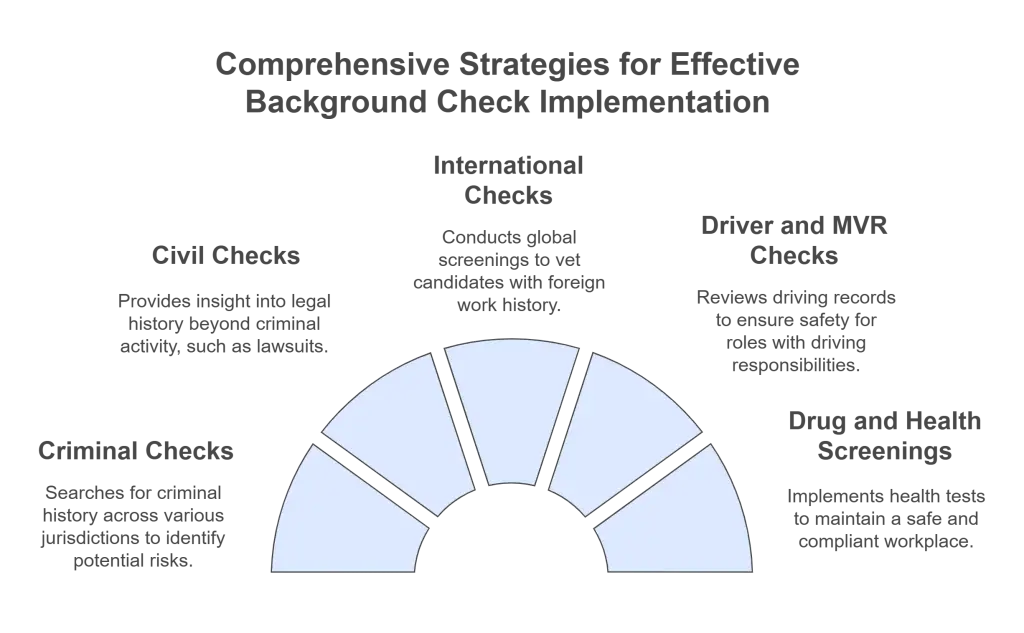A background check collects and verifies an individual’s information or records from private and public sources. Employers use it to check a person’s criminal record, education, employment history, motor vehicle records, and credit history. This helps create a safe and productive environment.
Key Takeaways
- Purpose: Background checks verify history and qualifications to ensure safety and suitability.
- Key Elements: They include criminal records, employment, education, and credit history.
- Legal Compliance: Follow laws to avoid risks and ensure fair hiring practices.
- Workplace Safety: Checks promote trust and safety in the organization.
- Accessibility: Tools like GCheck make checks simple for businesses of all sizes.
What is a Background Check Useful For?
Trust and Transparency
Contract positions carry risks. Requiring background checks helps build a community of trust and transparency. It ensures that all employees have been vetted, reducing the risk of hiring someone with a problematic past. This process promotes a culture of honesty and accountability within the organization. Employees feel more secure knowing their colleagues have undergone similar scrutiny. Trust and transparency ultimately lead to a more cohesive and productive work environment.
EXPERT INSIGHT: Background checks are essential in enabling informed decision-making for hiring teams, whether you're a small business or a multinational company engaged in volume hiring. Delays in background checks can postpone an employee's start date, impacting productivity. Conversely, hiring before receiving a complete report poses risks, including potential safety concerns and reputational damage. In today's AI-driven world, where rapid results are expected, having a quick turnaround for background checks is imperative. Discover in this article how to achieve this for your company. - Emile Garcia, SHRM-SCP, CHRP, CHRBP
Legal Compliance
Background checks mitigate negligent hiring and wrongful termination lawsuits, helping businesses navigate legal requirements and avoid costly litigation. Employers must comply with various federal and state regulations when conducting background checks. These laws are designed to protect both the employer and the employee. Companies can avoid legal pitfalls and ensure a fair hiring process by adhering to these regulations. Additionally, maintaining compliance can enhance the company’s reputation and attract more qualified candidates.
Employee Safety
Background checks maintain workforce quality. They encourage honesty and communication while providing peace of mind among employees. Ensuring a safe work environment is a top priority for any employer. Companies can identify potential risks and take preventive measures by conducting thorough background checks. This proactive approach protects employees and minimizes the likelihood of workplace incidents. Employee safety leads to higher job satisfaction and productivity.

What Do Background Checks Show?
The information revealed depends on the type of background check and compliance requirements. Common checks include:
- Criminal Records: Searches for misdemeanors and felonies for the past seven years. This information is crucial for assessing the potential risk an individual might pose to the workplace. Criminal background checks can include national, state, and local databases. They may also reveal information about pending charges or past arrests. Understanding an individual’s criminal history helps employers make informed hiring decisions and maintain a safe work environment.
- Motor Vehicle Reports: Data from at least three years back. These reports are essential for positions that involve driving responsibilities. They provide details about an individual’s driving history, including traffic violations, DUIs, and license status. Ensuring an employee has a clean driving record helps reduce the risk of accidents and liabilities for the company. It also demonstrates the employer’s commitment to safety.
- Employment Verifications: Verification of past employment up to 7 years. This process involves contacting previous employers to confirm job titles, dates of employment, and reasons for leaving. Employment verifications help identify any discrepancies in the candidate’s resume. They also provide insights into the candidate’s work history and performance. Accurate employment verification ensures that the hiring decision is based on reliable information.
- Education Verifications: Verification of the highest degree obtained. This check confirms the authenticity of the educational qualifications listed by the candidate. It involves contacting educational institutions to verify degrees, certifications, and dates of attendance. Education verifications help prevent fraud and ensure the candidate is qualified. They also contribute to maintaining the integrity of the hiring process.
How Can I Run Background Checks?
For Small Businesses
GCheck’s all-in-one platform offers a simple, fully online process with built-in compliance tools and pay-as-you-go pricing. Get started in three steps: register, verify your account, and run your first check. The platform is user-friendly, making it accessible for businesses with limited resources. Small businesses can benefit from GCheck’s automated processes, which save time and reduce administrative burdens. Using GCheck, small businesses can ensure they make informed hiring decisions. The platform provides ongoing support and resources to help businesses navigate the background check process.
For High-Volume Enterprise Businesses
GCheck provides a dedicated team for setup, optimizing the candidate journey, recruiter experience, and adjudication processes. Customers using APIs for integration receive close partnerships for a successful launch. Large enterprises benefit from GCheck’s scalable solutions, which can efficiently handle high volumes of background checks. The platform’s advanced features, such as automated workflows and real-time updates, streamline the hiring process. By partnering with GCheck, enterprises can ensure compliance with legal requirements and industry standards. The dedicated support team helps address any issues promptly, ensuring a smooth experience for both recruiters and candidates.
What Does a Background Check Consist Of?

Criminal Background Checks
Searches local, state, federal, and international records for criminal history. These checks are essential for identifying potential risks associated with the candidate’s past behavior. Criminal background checks can include various offenses, such as felonies, misdemeanors, and infractions. They also reveal details about the nature and severity of the offenses. By conducting comprehensive criminal background checks, employers can make informed decisions and ensure a safe work environment.
Civil Background Checks
County or federal searches provide insight into legal history beyond criminal activity, such as restraining orders or breach of contract suits. These checks are crucial for roles that involve handling sensitive information or significant responsibilities. Civil background checks can reveal information about lawsuits, judgments, and liens. They provide a broader perspective on the candidate’s legal history, helping employers assess their reliability and integrity. Including civil background checks in the screening process enhances the overall thoroughness of the background check.
International Background Checks
Includes criminal history, global watchlists, and verifications outside the US. These checks are essential for candidates who have lived or worked abroad. International background checks help ensure the candidate’s history is thoroughly vetted, regardless of their geographic location. They can include screenings such as international criminal records, employment verifications, and education verifications. Employers can maintain consistent screening standards for all candidates by conducting international background checks.
Driver and MVR Background Checks
Searches driving records from state Departments of Motor Vehicles. These checks are vital for positions that involve driving responsibilities. They provide detailed information about the candidate’s driving history, including traffic violations, DUIs, and license status. Ensuring an employee has a clean driving record helps reduce the risk of accidents and liabilities for the company. Driver and MVR background checks also demonstrate the employer’s commitment to safety.
Drug and Health Screenings
Includes occupational health tests and controlled substance checks. These screenings are important for maintaining a safe and healthy workplace. Drug and health screenings can identify potential substance abuse issues that may impact job performance. They also help ensure compliance with industry regulations and company policies. By conducting regular drug and health screenings, employers can promote a culture of wellness and safety. These screenings can include pre-employment tests, random tests, and post-incident tests.
Verifications
Verifies employment and other important candidate data. These checks confirm the accuracy of the information provided by the candidate. Verifications include employment history, education credentials, professional licenses, and more. Ensuring the accuracy of candidate information helps prevent fraud and ensures the hiring decision is based on reliable data. Verifications also contribute to maintaining the integrity of the hiring process. By conducting thorough verifications, employers can build a trustworthy and qualified workforce.
How Does a Background Check Work?
Conducting background checks involves the following steps:
- Request a background check
- The candidate receives an email to authorize the check and provide information
- The candidate enters their information and signs a background check consent form electronically
- GCheck processes the information and conducts the screenings, and the report is posted to the GCheck Dashboard for review.
This streamlined process ensures that background checks are conducted efficiently and accurately. Employers can track the progress of the background check in real time and receive updates as each step is completed. The electronic consent form ensures compliance with legal requirements and provides a secure way to collect candidate information. Once the background check is complete, employers can review the report and make informed hiring decisions. The GCheck Dashboard provides a user-friendly interface for managing background checks and accessing reports.
What is a Background Check Procedure’s Turnaround Time?
Most checks are completed within 24 hours. The industry average is 3-5 business days, depending on the search depth and location. Database screenings are usually completed within seconds, while more comprehensive searches take longer.
Background Check Resources
- Evolution of Ban the Box
- Different Background Check Screenings
- Adverse Action Process
- Guide to Adjudication
- Drug Testing in the Workplace
- Fair Credit Reporting Act
Frequently Asked Questions (FAQs)
Will a background check show a DUI?
DUIs usually appear on criminal and motor vehicle record checks if they are convictions. Hiring decisions based on DUI records must comply with EEOC rules. It's important to understand the context and recency of the DUI when making a hiring decision. Employers should also consider the role and its requirements. For positions that involve driving, a DUI record may be more relevant.
Will a misdemeanor show up on a background check?
Misdemeanors, classified as crimes with less severe punishments, appear on background checks, though they may not show on state or international checks. The visibility of misdemeanors depends on the scope of the background check and the regulations of the state where the check is conducted. Employers should be aware of the legal limitations regarding using misdemeanor records in hiring decisions. When considering this information, it’s essential to evaluate the relevance of a misdemeanor to the job role. Understanding the context and recency of the misdemeanor is also crucial.
Would that be on my background check if I was arrested but never charged?
Arrests within the last seven years are flagged on background checks. Some states prohibit using arrest records as hiring criteria. Employers need to be aware of the legal restrictions in their state regarding arrest records. Arrests without convictions may not provide a complete picture of an individual's behavior or risk. Employers should focus on convictions rather than arrests to ensure a fair hiring process. Consulting legal counsel is advisable when considering arrest records when making hiring decisions.
What about warrants?
Only executed warrants appear on criminal records and background checks; open and bench warrants generally do not. Warrants indicate ongoing legal issues relevant to the candidate's ability to fulfill job duties. Employers should handle warrant information carefully, considering the legal implications and relevance to the job role. Understanding the nature of the warrant and the associated legal outcomes is crucial. Employers must also comply with local and federal laws when using warrant information in hiring decisions.
Do restraining orders appear on background checks?
Restraining orders, being civil, do not usually appear on background checks, except in special cases like high-security roles. The presence of a restraining order may indicate potential interpersonal issues that could affect workplace safety. Employers should consider the nature and context of the restraining order when making hiring decisions. Additional scrutiny may be necessary for roles that require high levels of trust and security. Consulting with legal counsel can help navigate the complexities of using restraining order information in hiring.
If I expunge charges, will they still appear on background checks?
Expunged charges are removed from records and should not appear on background checks. It is unethical for firms to report them. Employers should ensure their background check providers comply with laws regarding expunged records. Using expunged records in hiring decisions can lead to legal consequences and ethical issues. Candidates with expunged records should not be penalized for past actions that have been legally removed. Maintaining compliance with expungement laws is crucial for fair hiring practices.
Will a background check show dismissed charges?
Dismissed charges may still appear on a background check, depending on the jurisdiction and the completeness of the records. Employers should consider the relevance of dismissed charges to the job role. Dismissed charges indicate that the legal process did not result in a conviction, and therefore, the individual should not be treated as guilty. Understanding the reasons behind the dismissal can provide context for the employer. Legal counsel can guide you in handling dismissed charges appropriately when hiring.
How far back do background checks go?
The standard look-back period for background checks is typically seven years, which can vary by state and type of check. Some states allow for longer look-back periods for certain types of offenses. Employers should be aware of the legal limitations in their state regarding the reporting period for background checks. A more extended look-back period may be justifiable for positions of high trust or responsibility. Understanding the applicable laws and regulations ensures compliance and fairness in the hiring process.
Do background checks include social media?
Social media checks are not typically part of standard background checks but can be included as an additional service. Employers should use social media checks cautiously and ethically. They can provide insights into a candidate's character and behavior outside work. However, employers must respect privacy and avoid discrimination based on protected characteristics. Developing a clear policy for social media checks helps ensure consistency and fairness.
Can I run a background check on myself?
Yes, individuals can run background checks on themselves to see what employers might find. Self-background checks can help individuals identify and correct inaccuracies. It also allows individuals to understand what potential employers will see. Correcting errors or expunging outdated information can improve one's chances in the job market. Various services, including GCheck, offer personal background check options.
What are the common reasons for failing a background check?
Common reasons include criminal convictions, discrepancies in employment history, falsified education records, and failed drug tests. Each employer has different criteria for what constitutes a failed background check. Understanding the job requirements and how your background aligns with them can help mitigate potential issues. Being honest and transparent during the application process is crucial. Employers should communicate clearly about their background check policies to avoid misunderstandings.
Conclusion
GCheck’s advanced background check tools make hiring faster, easier, and more accurate. Sign up or talk to sales to get started today. Conducting comprehensive background checks helps create a safe and productive workplace. Employers can make informed decisions and ensure they are compliant with legal requirements. GCheck provides reliable and detailed background check services to meet the needs of businesses of all sizes. Leveraging GCheck's resources and tools can enhance your hiring process and build a trustworthy workforce.

GCheck Editorial Team
Meet the GCheck Editorial Team, your trusted source for insightful and up-to-date information in the world of employment background checks. Committed to delivering the latest trends, best practices, and industry insights, our team is dedicated to keeping you informed.
With a passion for ensuring accuracy, compliance, and efficiency in background screening, we are your go-to experts in the field. Stay tuned for our comprehensive articles, guides, and analysis, designed to empower businesses and individuals with the knowledge they need to make informed decisions.
At GCheck, we're here to guide you through the complexities of background checks, every step of the way.






